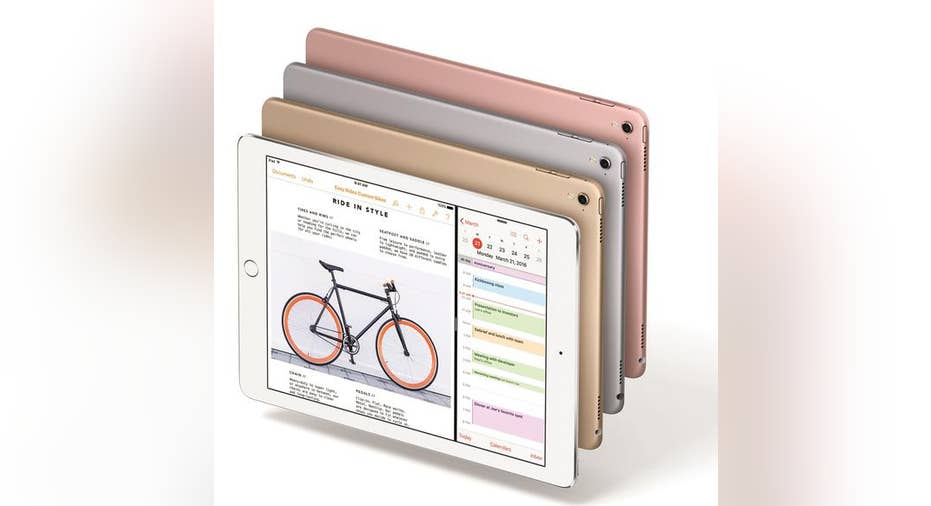Apple Inc.s iPad Pro as a Windows PC Replacement?

The new 9.7-inch iPad Pro. Image credit: Apple.
At Apple's March 21 product launch event, the company introduced the new 9.7-inch iPad Pro. The company, which has seen iPad sales decline year-over-year for about two years straight, targeted this new device at two types of customers.
The first is, obviously, customers with older 9.7-inch iPads looking to upgrade to newer, better devices. The second, interestingly enough, are users of personal computers running Microsoft's Windows operating system.
Apple marketing chief Phil Schiller pointed out -- as PC processor maker Intel is so keen to point out to its own investors -- that there are around 600 million PCs out there that are "over five years old." The new 9.7-inch iPad Pro is targeted at those users, too.
In this article, I'd like to compare the value proposition of replacing such ancient PCs with iPad Pros with the value proposition associated with replacing such systems with newer Windows PCs.
The cost of an iPad Pro 9.7-inchThe iPad Pro 9.7-inch (without cellular connectivity) costs $599 for a model with 32 gigabytes of storage, with the 128-gigabyte and 256-gigabyte versions going for $749 and $899, respectively. For a full PC replacement, 32 gigabytes of storage isn't going to cut it, so let's go with the $749 model.
To be a "true" Windows PC replacement, we're going to want to throw in the Smart Keyboard, a $149 add-on, bringing the total up to $898. Apple also touts the Apple Pencil accessory as an essential part of the iPad Pro experience, so let's throw that in, too, for an additional $99.
All told, this "Windows PC replacement" will run customers just shy of $1000.
What kind of Windows PC can we get for this kind of money?For $1000, there are two viable routes one could go. Firstly, a customer can go with a thin-and-light clamshell. Or, alternatively, such a customer could go with a 2-in-1 device that's similar to the iPad Pro but runs Microsoft Windows 10.
Starting with the latter, I think that a Microsoft Surface Pro 4 is the closest competitor to the iPad Pro in the Windows world. A model with 128 gigabytes of storage and an Intel Core m3 processor costs $899. This includes a "Surface Pen" but doesn't come with Microsoft's own keyboard accessory. Throwing the "Type Cover" for the Surface Pro 4 brings the cost up to $1028.
In this case, I would argue that the iPad Pro offers a superior tablet/touch-first experience, while the Surface Pro 4 offers a better "traditional PC" experience.
Alternatively for around $1000, one could purchase a Dell XPS 13 laptop with 8 gigabytes of RAM, an Intel Core i5-6200U processor, 128 gigabytes of storage, and a 13.3-inch 1920-by-1080 display. This would arguably be far better for "normal" productivity (word processing, spreadsheets, etc.) than either the iPad Pro or the Surface, but for people who value pen input, both the Surface Pro and the iPad Pro will obviously be superior devices.
It's not unreasonably priced for what you're gettingI see a lot of folks making a big deal about the pricing of the new iPad Pro, but it's really not out of line with what Microsoft is asking for its Surface device when all is said and done. The A9X is a very capable chip in the ballpark of the Core m3. The iPad Pro is lighter, slimmer, probably has a superior display (wider color gamut, True Tone technology, etc.) and so on.
The only problem with the iPad Pro is that it won't run traditional Windows applications. For users that have extensive Windows-only software libraries, the new iPad Pro is probably a no-go. For users that don't need that legacy software and are eager to move to a touch/pen oriented computing paradigm, the iPad Pro will probably be quite attractive.
The article Apple Inc.s iPad Pro as a Windows PC Replacement? originally appeared on Fool.com.
Ashraf Eassa owns shares of Intel. The Motley Fool owns shares of and recommends Apple. The Motley Fool owns shares of Microsoft. The Motley Fool recommends Intel. Try any of our Foolish newsletter services free for 30 days. We Fools may not all hold the same opinions, but we all believe that considering a diverse range of insights makes us better investors. The Motley Fool has a disclosure policy.
Copyright 1995 - 2016 The Motley Fool, LLC. All rights reserved. The Motley Fool has a disclosure policy.



















